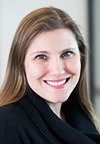
On this page...
Overview
The National Cancer Institute's Epidemiology and Genomics Research Program (EGRP) hosted a workshop, "Understanding the Role of Muscle and Body Composition in Studies of Cancer Risk and Prognosis in Cancer Survivors," on September 25-26, 2017, in the NIH Conference Center at 5635 Fishers Lane in Rockville, MD.
The purpose of this workshop was to bring together scientists to discuss current research examining how body composition affects cancer outcomes and identify the research needed to inform recommendations for cancer survivors. The workshop identified key methodological challenges and approaches to optimize measurement and analysis, by building on past examples studying sarcopenia, cachexia, and frailty in aging populations, to better understand the implications for cancer survivors.

Joanne Elena, PhD, MPH
Program Director, Clinical and Translational Epidemiology Branch
elenajw@mail.nih.gov
Agenda & Links to Presentations
View agenda for Monday, September 25
| Time | Topic |
|---|---|
| 8:30 a.m. - 8:45 a.m. | Registration |
| 8:45 a.m. - 9:00 a.m. |
Welcome |
| 9:00 a.m. - 9:30 a.m. |
Overview of Workshop |
| 9:30 a.m. - 10:00 a.m. |
Evidence of the import of sarcopenia and other measures of body composition on cancer survival |
| 10:00 a.m. - 10:30 a.m. |
Body composition and adverse outcomes in cancer survivors: a review of suggested explanations |
| 10:30 a.m. - 10:45 a.m. | Discussion |
| 10:45 a.m. - 11:00 a.m. | Break |
| 11:00 a.m. - 11:20 a.m. |
Lean mass and muscle physiology |
| 11:20 a.m. - 11:40 a.m. |
Fatty infiltration into muscle and fibrotic tissue in adipose tissue: its relation to inflammation |
| 11:40 a.m. - 12:00 p.m. |
Breast adipose inflammation: a silent killer |
| 12:00 p.m. - 12:15 p.m. | Discussion |
| 12:15 p.m. - 1:15 p.m. | Poster Session and Lunch (Cafeteria on site) |
| 1:15 p.m. - 1:35 p.m. |
Will current data-driven approaches/background of sarcopenia help us? |
| 1:35 p.m. - 1:55 p.m. |
Different cutpoints/landmarks: finding meaningful cutpoints to predict those at risk for poor outcomes |
| 1:55 p.m. - 2:15 p.m. |
Measuring function in cancer patients with sarcopenia: do we need disease- or sarcopenic-specific measures? |
| 2:15 p.m. - 2:35 p.m. |
Applying what we've learned from clinical trials about cachexia to cancer survivors |
| 2:35 p.m. - 3:00 p.m. | Panel Discussion |
| 3:00 p.m. - 3:15 p.m. | Break |
| 3:15 p.m. - 3:45 p.m. |
The sarcopenic phenotypes: overview and role of body composition quantification methods |
| 3:45 p.m. - 4:10 p.m. |
Measuring body composition/sarcopenia in large studies using anthropometry and BIA |
| 4:10 p.m. - 4:35 p.m. |
DXA new functions and algorithms for lean mass: experimenting with different approaches |
| 4:35 p.m. - 5:00 p.m. |
Using ultrasound technology to measure sarcopenia |
| 5:00 p.m. - 5:30 p.m. | Panel Discussion |
View agenda for Tuesday, September 26
| Time | Topic |
|---|---|
| 8:30 a.m. - 8:45 a.m. |
Welcome |
| 8:45 a.m. - 9:10 a.m. |
Nutritional interventions: optimal strategies for reducing adiposity while maintaining muscle mass |
| 9:10 a.m. – 9:35 a.m. |
Exercise therapy to improve muscle quantity and quality in cancer survivors |
| 9:35 a.m. – 10:00 a.m. |
Where are the gaps? What research do we need to inform guidelines for clinicians? |
| 10:00 a.m. – 10:30 a.m. | Discussion |
| 10:30 a.m. - 10:40 a.m. | Break |
| 10:45 a.m. – 11:45 a.m. |
Panel Discussion: Identification of Research Opportunities and Gaps Setting Priorities for Future Directions of Research Panel Discussion |
| 11:45 a.m. – 12:00 p.m. |
Lessons learned from transdisciplinary research in energetics and cancer |
| 12:00 p.m. – 1:00 p.m. | Lunch (Cafeteria on site) |
| 1:00 p.m. – 2:30 p.m. |
Open Discussion on the Future Directions of Research Sample Questions: |
| 2:30 p.m. – 3:00 p.m. |
Wrap up/Adjourn |
*Permission has been given by the presenters to link to workshop videos.
Planning Committee
- Bette Caan, DrPH
 , Kaiser Permanente Northern California
, Kaiser Permanente Northern California - Joanne Elena, PhD, MPH, National Cancer Institute
- Lisa Gallicchio PhD, National Cancer Institute
- Tamara Harris, MD, MS, National Institute on Aging
- Steven Heymsfield, MD
 , Louisiana State University
, Louisiana State University - Carla Prado, PhD, RD
 , University of Alberta
, University of Alberta - Sharon Ross, PhD, MPH, National Cancer Institute
- Shlomit Strulov Shachar, MD, University of North Carolina Chapel Hill
- Elaine Trujillo, MS, RD, National Cancer Institute